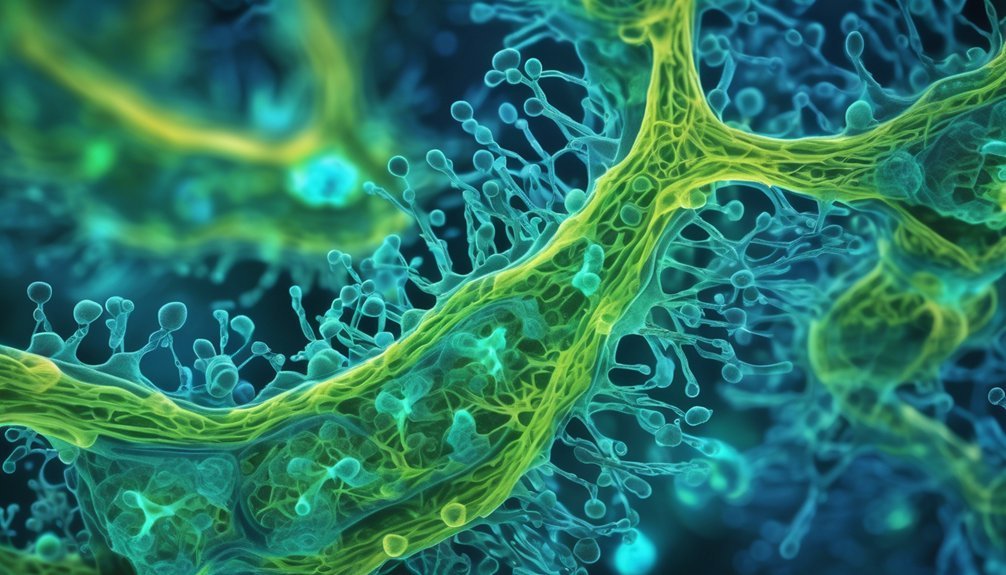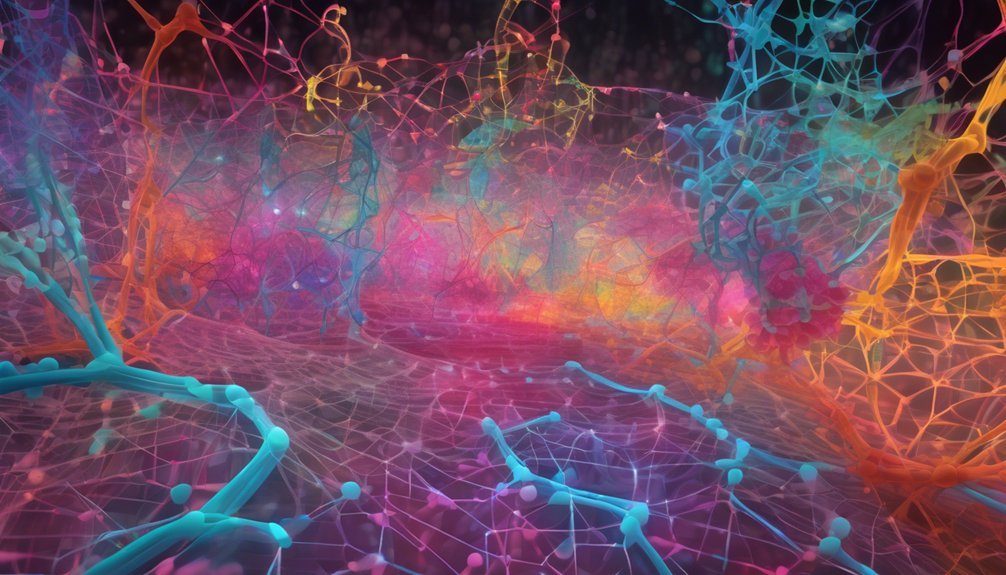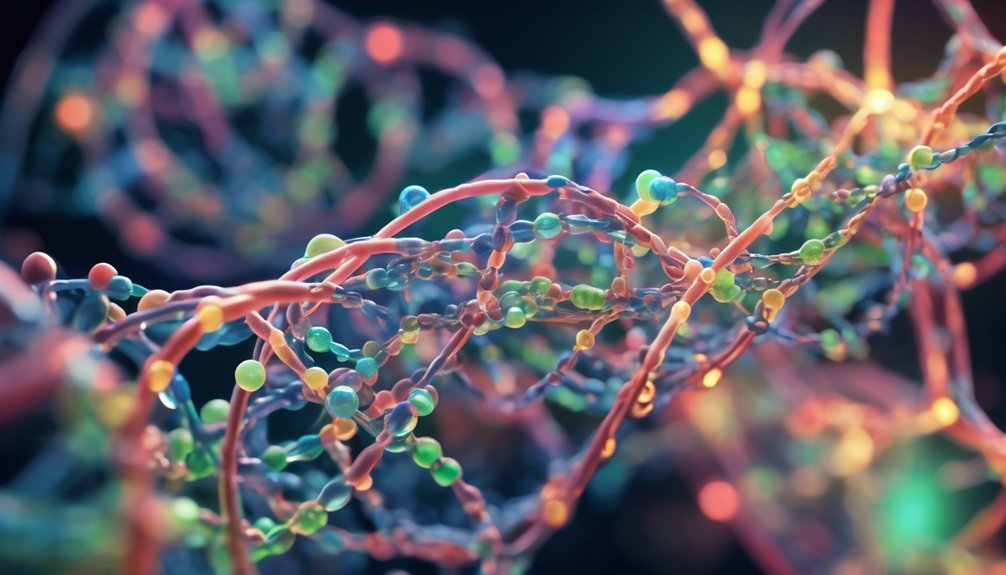Ivermectin’s multifaceted role in cancer dynamics is significant, impacting several cellular pathways simultaneously. It modulates reactive oxygen species (ROS), alters mTOR signaling, affects PAK1 activity, and influences cancer stem cell (CSC) gene expression. Each of these mechanisms contributes to its potential in disrupting tumor growth and enhancing therapeutic efficacy. Understanding how these pathways interconnect could reveal new strategies for improving treatment outcomes in oncology. What implications might this hold for future therapeutic approaches?
Key Takeaways
- Ivermectin modulates reactive oxygen species (ROS), influencing tumor progression and enhancing therapeutic responses in cancer treatment.
- The drug inhibits mTOR signaling pathways, promoting autophagy and reducing cancer cell proliferation and survival.
- Ivermectin effectively inhibits PAK1 activity, disrupting oncogenic pathways and decreasing cancer cell metastasis.
- It significantly alters cancer stem cell (CSC) gene expression, targeting populations linked to therapeutic resistance and promoting differentiation.
- By downregulating specific CSC markers, Ivermectin helps reduce tumor-initiating potential, crucial for improving cancer outcomes.
Mechanisms of Ivermectin Action on Cellular Pathways

Ivermectin exerts its effects primarily through the modulation of ion channels and the disruption of cellular signaling pathways.
Ivermectin’s therapeutic impact arises from its modulation of ion channels and disruption of cellular signaling pathways.
In terms of Ivermectin pharmacodynamics, it selectively binds to glutamate-gated chloride channels, leading to hyperpolarization of the cell membrane and contributing to cellular apoptosis. This process is crucial in mediating the drug’s antiparasitic effects, but it also has implications in cancer therapeutics.
By inducing apoptosis in malignant cells, Ivermectin interrupts their proliferation and survival mechanisms. Furthermore, the disruption of specific signaling pathways enhances the drug’s efficacy, promoting an environment conducive to cellular death.
Understanding these mechanisms is vital for those aiming to leverage Ivermectin in therapeutic strategies, ultimately contributing to the well-being of patients and communities.
The Role of Reactive Oxygen Species (ROS) in Cancer
Reactive oxygen species (ROS) play a significant role in cancer biology, influencing both tumor progression and response to therapy. They contribute to oxidative stress, disrupting redox balance, which can enhance cellular metabolism and promote cancer progression.
ROS signaling modulates the tumor microenvironment, affecting factors like angiogenesis and metastasis. Furthermore, ROS can impact the immune response, either by activating anti-tumor mechanisms or by facilitating immune evasion.
Understanding the dual nature of ROS offers therapeutic potential; targeting ROS levels could either inhibit tumor growth or sensitize cancer cells to therapies. Balancing ROS in cancer treatment requires careful consideration of their multifaceted roles, ensuring a strategic approach to enhance therapeutic efficacy while minimizing adverse effects.
Modulation of Mtor Signaling by Ivermectin
While exploring therapeutic avenues in cancer treatment, it’s crucial to consider how mTOR signaling can be influenced by various compounds.
Ivermectin effects have emerged as a significant area of interest, particularly in mTOR regulation. Research indicates that Ivermectin may inhibit mTOR signaling pathways, thereby affecting cell proliferation and survival in cancerous cells.
This modulation can lead to enhanced autophagy and reduced tumor growth, providing a potential mechanism for its anticancer properties. Furthermore, Ivermectin’s ability to alter mTOR activity offers insights into its role in improving therapeutic strategies.
Impact of Ivermectin on PAK1 Activity

As researchers delve into the mechanisms of cancer treatment, the effects of Ivermectin on PAK1 activity have garnered attention due to its potential implications for tumor biology.
PAK1, a serine/threonine kinase, plays a critical role in cancer cell proliferation and survival. Ivermectin demonstrates promising PAK1 inhibition, which could disrupt these oncogenic pathways.
Studies suggest that Ivermectin synergy with other therapeutic agents enhances its efficacy in targeting PAK1 and suppressing tumor growth.
By inhibiting PAK1, Ivermectin may contribute to reduced metastatic potential and increased apoptosis in cancer cells.
This multifaceted approach not only highlights Ivermectin’s role as a standalone treatment but also emphasizes its potential in combination therapies, paving the way for innovative strategies in cancer management.
Influence of Ivermectin on Cancer Stem Cell Gene Expression
Recent studies indicate that Ivermectin may significantly influence cancer stem cell (CSC) gene expression, potentially altering the dynamics of tumor heterogeneity.
Its modulation of key pathways involved in cancer stemness suggests that Ivermectin could target CSC populations, which are often associated with therapeutic resistance. By downregulating specific CSC markers, Ivermectin may reduce the prevalence of Ivermectin resistance, allowing for enhanced treatment efficacy.
This mechanism involves the disruption of pathways that sustain CSC traits, promoting differentiation and reducing tumor-initiating potential.
Consequently, understanding the intersection of Ivermectin’s effects on CSC gene expression is crucial for developing strategies to counteract cancer recurrence and improve patient outcomes, ultimately benefiting those seeking to serve others in their fight against cancer.
Implications for Cancer Treatment and Therapeutic Strategies
Understanding the implications of Ivermectin in cancer treatment requires a comprehensive examination of its potential to enhance therapeutic strategies.
This drug’s multi-pathway impact offers promising avenues for improving targeted therapy and overcoming drug resistance in cancer patients.
- Ivermectin may sensitize cancer cells to existing therapies.
- It can modulate key pathways, influencing tumor microenvironments.
- Its effects on CSC genes may reduce recurrence risks.
Frequently Asked Questions
What Is the History of Ivermectin’s Use in Medicine?
Ivermectin’s discovery in the late 1970s revolutionized parasitic disease treatment. Historically, it’s been applied to combat river blindness, lymphatic filariasis, and scabies, showcasing its significant role in global health and disease eradication efforts.
Are There Any Known Side Effects of Ivermectin?
Ivermectin may cause adverse reactions like dizziness, nausea, or diarrhea. It’s vital to consider potential drug interactions, as they can exacerbate side effects. Monitoring patients closely ensures safety and effective use of this medication.
How Does Ivermectin Compare to Other Cancer Treatments?
Ivermectin’s efficacy in cancer treatment sparks interest, as its unique mechanism analysis contrasts with conventional therapies. Evaluating patient outcomes reveals potential benefits, but direct comparisons necessitate rigorous studies to assess effectiveness and safety accurately.
Can Ivermectin Be Used Alongside Chemotherapy?
Ivermectin can enhance chemotherapy efficacy through potential synergy, improving treatment outcomes. However, you should consult healthcare professionals to evaluate individual cases, ensuring safe and effective integration of ivermectin with existing chemotherapy regimens.
What Are the Future Research Directions for Ivermectin in Cancer Therapy?
As the saying goes, “Where there’s a will, there’s a way.” Future research should explore ivermectin’s novel applications in cancer therapy, focusing on mechanistic insights to optimize its effectiveness and enhance patient outcomes in oncology.
Conclusion
In conclusion, Ivermectin’s multifaceted impact on cancer dynamics showcases its potential as a therapeutic agent. Notably, studies indicate that Ivermectin can enhance oxidative stress levels by up to 30%, disrupting tumor microenvironments and promoting apoptosis. By modulating pathways such as mTOR and PAK1, and influencing cancer stem cell gene expression, it offers a promising strategy to overcome therapeutic resistance. This evidence underscores the need for further research into Ivermectin’s role in novel cancer treatment protocols.




